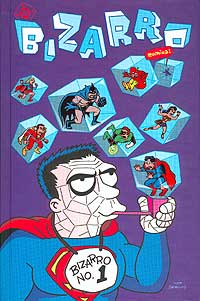 Matt Groening's official cover for "Bizarro Comics"
Matt Groening's official cover for "Bizarro Comics" |
It sure sounds like a good idea. Use the superheroes to lure mainstream America into reading the work of the independent artists, while also appealing to the audience of those alternative works. (And perhaps breath some life into stale characters?) Some of the better-known indy "names" included in the project are Eddie Campbell ("From Hell"), Gilbert Hernandez ("Love and Rockets"), Tony Millionaire ("Maakies"), Paul Pope ("Heavy Liquid") and Andi Watson ("Breakfast After Noon"), along with about fifty others. Their collaborations have created an anthology of mostly light-hearted takes on the lives of superheroes.
Don't expect Superman to become a potty-mouth, or Batman and Wonder Woman "get it on." Although the back cover promises "wild and uninhibited stories," reading the book feels a bit like watching precocious children play with daddy's very expensive toys while daddy watches them very closely. Ironically the results of these "adult" artists' work may well be the best all-ages fare DC has produced in a long time. As with most anthologies the quality varies, but of the nearly thirty tales a number stand out as particularly charming and memorable uses of the famed characters.
"Porcine Panic," by Andy Merrill and Jason Little seem to have spied on my bathroom with the realistic portrayal of an Aquaman doll's bathtub struggle with a piggy handpuppet. Tony Millionaire and Chip Kidd turn in a masterfully sardonic "The Bat-Man." Colored an antique tea-stain brown, with a mood reminiscent of the 1930s horror movies, Bruce Wayne becomes a creepy, eccentric playboy who flies around in his "bat-gyro." Another stand-out, Ellen Fornay and Ariel Bordeaux imagine "Wonder Woman's Day Off," when she skips out for a cappuccino and a poetry slam, with her big-boots-and-tiara-look fitting right into the downtown hipster scene.
 Curtesy of Dan Clowes Dan Clowes' rejected, original cover for "Bizarro Comics." Click on it for a larger view in a separate window |
Did these artists pay a price for their souls? Perhaps. At least one work was rejected for content - the original cover by Dan Clowes, creator of "Eightball" and easily one of America's top five comix makers. It cost DC plenty to reject it, not only the kill-fee to Clowes, who said he would be "happy" to provide "inflammatory quotes," for this piece, but also the book's original designer, Chip Kidd, who quit in protest. One of America's top book designers, Kidd has said he would be "loathe" to work for DC's comics division ever again. DC remains mum on the reasons for its rejection, saying only that, "due to a difference of editorial opinion, DC Comics felt that the cover Dan Clowes created was different from the one we envisioned for Bizarro Comics." Clowes' version appears with this article so you can judge for yourself why DC may not have liked it. Perhaps they didn't like their properties portrayed as woeful and mundane: feeling low and worrying about taxes.
Readers may also wonder why DC took artists whose reputation rests on total self-expression and insisted that they either write or draw a story, but not both. Though a plausible editorial reason could be imagined, it turns out to be strictly business. According to some of the freelancers they hire, DC will only allow creators to both write and draw a story if they have been legally incorporated as a business. The exact reasons for this can't be confirmed since the company refuses to comment on its contractual policies, but it most likely involves not having to pay benefits, avoiding character ownership lawsuits, and other sleazy, cheap legalities. In this light the book seems a lot less alternative and artistic than it would like you to believe.
The quality of work in "Bizarro Comics" definitely reaches the higher, but still limited, level set for it. But readers looking forward to radical reinterpretations of American icons may feel suckered by a bait and switch. Others readers drawn in by the superheroes will be missing out on the truly uninhibited voices they could have been introduced to. DC just needs to have the courage of their convictions.
"Bizarro Comics" can be found at all comicbook stores and regular bookstores as well.
